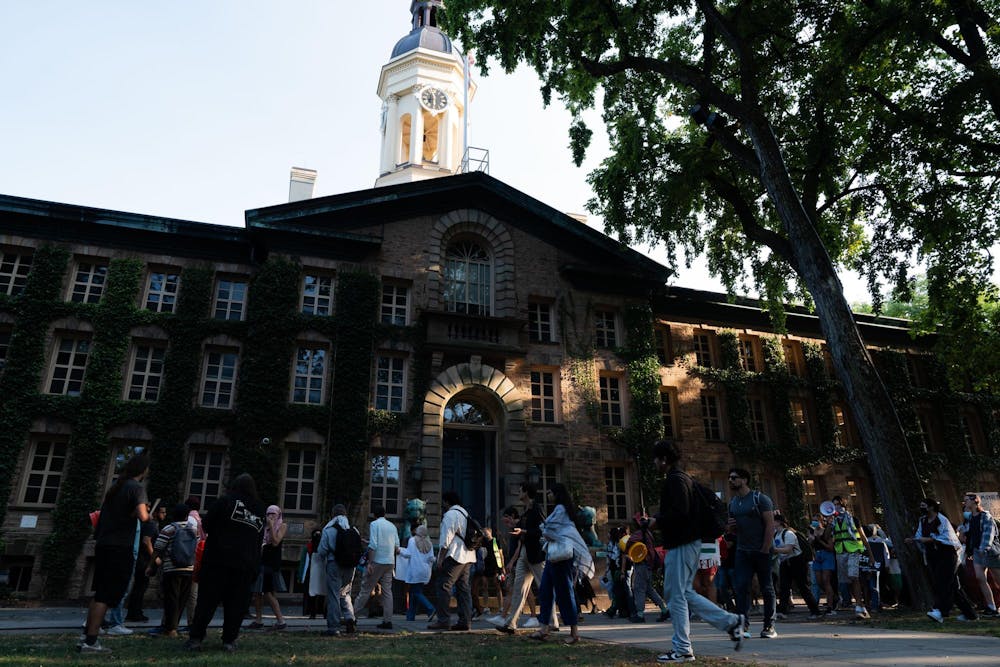On Sept. 5, the University retracted its decision to ban protests on the front lawn of Nassau Hall. Cannon Green and the Prospect House grounds remain off-limits locations to protest.
According to University spokesperson Jennifer Morrill, the change was made because the walkways in front of Nassau Hall “have long been an approved protest site.”
“Historically, we have recognized — and we continue to recognize — that protests legitimately spill onto the lawn. We have changed our language to reflect that,” she wrote in a statement to The Daily Princetonian.
Since the launch of the University’s new protest site a week ago, University officials have asserted that no policy changes occurred since the end of the last semester, which was marked by turmoil between the administration and protesters following the “Gaza Solidarity Encampment.”
“You may be wondering whether Princeton’s policies relating to protests and demonstrations will change in light of last year’s activity. The short answer is: no,” a letter from top administrators — including Vice President for Campus Life W. Rochelle Calhoun, Dean of the College Michael Gordin, and Dean of the Faculty Gene Jarrett — stated.
The University’s reversal of the Nassau Hall lawn ban has effectively removed the most significant update made to University policy.
The FAQ page of the Protests and Free Expression website, which launched on Aug. 27, has been updated to reflect this change. Previously, the site read, “Are Nassau Hall’s front lawn, Cannon Green, or Prospect House grounds available for events, protests or demonstrations? No. Front campus (the lawn in front of Nassau Hall), Cannon Green, and Prospect House lawn and garden are reserved for officially sanctioned University events, and are not available for any other organized activities.”
A question regarding Nassau Hall is now separate from the section on Cannon Green and Prospect House.
“Is the Nassau Hall front lawn available for protests or demonstrations?” a new FAQ tab reads. “Yes. The walkways in front of Nassau Hall are expressly recognized as legitimate protest sites, and the University has historically recognized and continues to recognize that protests may legitimately spill over onto the lawn.”
The first pro-Palestine protest of the semester — held on Sept. 3 — targeted attacks towards the ban of protest activity on campus spaces.
“If somebody from the administration comes over and says, ‘here’s a little sheet of paper; you’re walking on the grass,’ I want you to go find [a protest marshal] and tell them, tell this guy to f--- off,” Aditi Rao GS, an organizer with Princeton Israeli Apartheid Divest (PIAD) told the crowd.
Although the protesters avoided stepping onto Cannon Green during their campus tour of protest sites from the Spring semester, during their stop at Nassau Hall, some stepped onto the lawn.

“We have tried to follow the University’s process, and they’ve shifted the goalposts … Today we played by the rules … [but] I would say we’re not deterred,” Urvi Kumbhat GS, another organizer, said.
A Sept. 3 email to the University community from Vice President for Student Life W. Rochelle Calhoun denied that the policies changed “in light of last year’s activity.”
Princeton University Postdocs and Scholars (PUPS), the union for postdoctoral researchers on campus who have frequently held protests in front of Nassau Hall, wrote a statement to the ‘Prince’ in reaction to the rule reversal.
“The University’s ability to change these and other policies on a whim is why we’re fighting for a strong contract to protect workers’ rights to protest among many other things,” they said.
“We are glad that the University loosened this one restriction — but what this shows is not their reasonableness, but the untenability of their rules overall,” Anna Buretta ’27 and Liz Kunz ’27, co-coordinators of Sunrise Princeton, said. Sunrise is a protest-oriented student organization dedicated to climate activism.
“We believe that it is important to continue pushing against the remaining draconian restrictions on protests. Princeton prides itself on free speech, and we must ensure that they do not enshrine protest as a lesser form of expression than speech in their official codes,” Buretta added.
Olivia Sanchez is an associate News editor for the ‘Prince.’ She is from New Jersey and often covers the graduate school and academic departments.
Please send corrections to corrections[at]dailyprincetonian.com.








